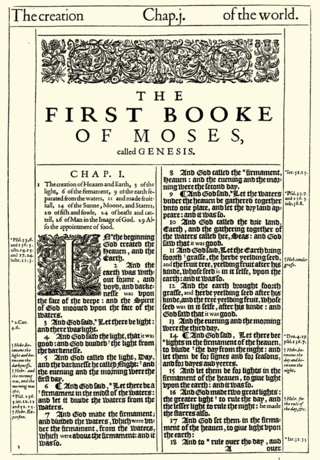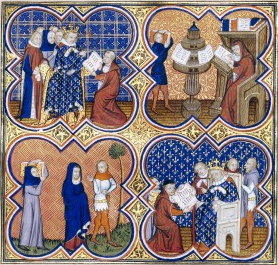Enlightenment or enlighten may refer to:

Romantic music is a stylistic movement in Western Classical music associated with the period of the 19th century commonly referred to as the Romantic era. It is closely related to the broader concept of Romanticism—the intellectual, artistic and literary movement that became prominent in Western culture from approximately 1798 until 1837.
Unitarian or Unitarianism may refer to:
Symbolism or symbolist may refer to:
Neoclassical or neo-classical may refer to:
Populist Party may refer to:

The King James Only movement asserts the belief that the King James Version (KJV) of the Bible is superior to all other translations of the Bible. Adherents of the King James Only movement, mostly members of The Church of Jesus Christ of Latter-day Saints, Conservative Anabaptist, traditionalist Anglo-Catholics, Conservative Holiness Methodist and some Baptist churches, believe that the KJV needs no further improvements because it is the greatest English translation of the Bible which was ever published, and they also believe that all other English translations of the Bible which were published after the KJV was published are corrupt.

The House of Wisdom, also known as the Grand Library of Baghdad, was a major Abbasid public academy and intellectual center in Baghdad and one of the world's largest public libraries during the Islamic Golden Age. The House of Wisdom was founded either as a library for the collections of the Caliph Harun al-Rashid in the late 8th century or was a private collection created by al-Mansur to house rare books and collections of poetry in Arabic. During the reign of the Caliph al-Ma'mun, it was turned into a public academy and a library.

Sant Tukaram Maharaj, also known as Tuka, Tukobaraya, Tukoba, was a Hindu, Marathi Saint of "Varkari sampradaya" in Dehu village, Maharashtra in 17th century. He was a bhakt of Lord Pandurang of Pandharpur. He is best known for his devotional poetry called Abhanga, which are popular in Maharashtra, many of his poems deals with social reform.

Romantic poetry is the poetry of the Romantic era, an artistic, literary, musical and intellectual movement that originated in Europe towards the end of the 18th century. It involved a reaction against prevailing Enlightenment ideas of the 18th century, and lasted approximately from 1800 to 1850. Romantic poets rebelled against the style of poetry from the eighteenth century which was based around epics, odes, satires, elegies, epistles and songs.

Akka Mahadevi was one of the early poets of Kannada literature and a prominent person in the Lingayat Shaiva sect in the 12th century. Her 430 extant Vachana poems, and the two short writings called Mantrogopya and the Yogangatrividh are considered her most notable contribution to Kannada literature. She composed fewer poems than other saints of the movement. The term Akka is an honorific given to her by great saints such as Basavanna, Siddharama and Allamaprabhu and an indication of her high place in the spiritual discussions held at the "Anubhava Mantapa". She is seen as an inspirational woman in Kannada literature and in the history of Karnataka. She considered the god Shiva as her husband,.
The King James Version is an English translation of the Bible, first published in 1611.
Shu'ubiyya was a literary-political movement which opposed the privileged status of Arabs within the Muslim community and the Arabization campaigns particularly by the Ummayads. The vast majority of the Shu'ubis were Persian.
Traditionalism is the adherence to traditional beliefs or practices. It may also refer to:
A vinyasa is a smooth transition between asanas in flowing styles of modern yoga as exercise such as Vinyasa Krama Yoga and Ashtanga Vinyasa Yoga, especially when movement is paired with the breath.
Maltese literature is any literature originating from Malta or by Maltese writers or literature written in the Maltese language.
Sanātana Dharma is an alternative name for Hinduism used in Sanskrit and other Indian languages alongside the more common Hindu Dharma.

Translation is the communication of the meaning of a source-language text by means of an equivalent target-language text. The English language draws a terminological distinction between translating and interpreting ; under this distinction, translation can begin only after the appearance of writing within a language community.
French Empire may refer to:
Islamic Reformism may refer to:
This page is based on this
Wikipedia article Text is available under the
CC BY-SA 4.0 license; additional terms may apply.
Images, videos and audio are available under their respective licenses.






